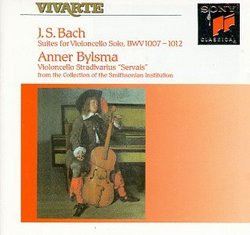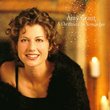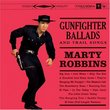| All Artists: Johann Sebastian Bach Title: Bach: 6 Suites for Cello, BWV 1007-1012 Members Wishing: 1 Total Copies: 0 Label: Sony Original Release Date: 1/1/1993 Re-Release Date: 2/9/1993 Genre: Classical Styles: Chamber Music, Historical Periods, Baroque (c.1600-1750), Instruments, Strings Number of Discs: 2 SwapaCD Credits: 2 UPC: 074644804720 |
Search - Johann Sebastian Bach :: Bach: 6 Suites for Cello, BWV 1007-1012
 | Johann Sebastian Bach Bach: 6 Suites for Cello, BWV 1007-1012 Genre: Classical
Anner Bylsma, who plays a Baroque cello in original condition, has written a whole book about the variety of bow strokes needed for this music. Fancying the use of the bow as an analogue to the use of a foil in a duel, he ... more » |
Larger Image |
CD DetailsSynopsis
Amazon.com Anner Bylsma, who plays a Baroque cello in original condition, has written a whole book about the variety of bow strokes needed for this music. Fancying the use of the bow as an analogue to the use of a foil in a duel, he calls Bach a "fencing master," a term that implies intense training, physical coordination used with spontaneity, and a readiness to change the approach instantly as each successive, fast-moving challenge demands. His playing makes the music fresh and new with a flexibility and vitality that illustrates the thesis of his book. --Joe McLellan Similarly Requested CDs
|
CD ReviewsShoppers note David W. Ross | Austin, Texas | 02/27/2000 (5 out of 5 stars) "Shoppers should note that Anner Bylsma has recorded the Bach Suites twice. The 2 volume set Sony #48047 was recorded in 1992, while Sony #61811 and #61812 are reissues of a 1979 recording. Both are outstanding. The later set, which I own, was recorded on a very large instrument, the "Stradivarius Servais," in a very resonant recording. Some critics prefer the performance on the earlier set, which has a rather dry sound. I have been waiting for it to be reissued so that I can obtain Volume 2." As a baroque cello student... Alexandra Roedder | between here and there | 10/28/2004 (5 out of 5 stars) "As a student of baroque cello, studying under one of Bylsma's own students, I find these recordings inspiring. They are always fresh and interesting, with new information to be found. His version here is simply one of the many ways of playing the pieces, and I think that, compared with the Rostropovich, Casals, and Ma recordings (which I also own), his is the only one that shows their flexibility. Using a baroque bow and tuning down to A=415 helps, of course, as does using gut strings and studying the patterns of baroque dance. I met Mr Bylsma recently at a masterclass at my conservatory, and I found him intelligent, insightful, and passionate. These recordings show those exact qualities. I love the tone of both instruments, and I love the way he makes the pieces speak, perhaps even with the same rhetorical ideas that J.S. Bach himself would have been considering. Rhetoric was a huge part of composition in the 17th and 18th centuries; none of the "modern" recordings, done on "normal" cellos, do this relationship quite as much justice as Mr Bylsma." A must for Bach cello suite fans John Harrington | anywhere, USA | 01/13/2000 (5 out of 5 stars) "To those of you who are chary of "historically informed" interpretations, you needn't be in this case. Though presumably Bylsma's approach is scholarly and "correct", there is nothing objective about his interpretation. It is sinewy, chocolately, dramatic, as winning and hearfelt an interpretation as any of the great performances on the modern cello by Cassals, Fournier, Rostropovich et al. Bylsma uses an actual period cello, not a reproduction, but manages to bring it alive and to coax out of it the sweetest sounds. Bylsma's tempi are faster than those familiar with modern interpretations might be prepared for, but his musicianship is so keen that the most precise phrasing remains intact and Bach's music never ends up sounding forced or rushed. Do your best to judge from the samples above, but I urge you to take a risk with this."
|

 Track Listings (18) - Disc #1
Track Listings (18) - Disc #1

